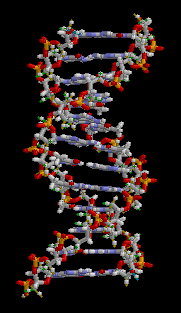Wpg Free Press: Honey, do these genes make me look hypertensive?
As the Winnipeg Free Press reports:
Peter Eck is an associate professor in the department of human nutritional sciences at the University of Manitoba. While he is an enthusiastic proponent of nutrigenomics and the idea of personalized medicine, he’s not as enthusiastic about the currently available tests….
Eck stresses that only about 10 genetic variations have been definitively linked to a health outcome. One of those is BRCA-1, which entered the public consciousness after actress Angelina Jolie had a double mastectomy and her ovaries removed when a DNA test revealed she had this gene variant, which substantially increases the risk of developing a type of breast and ovarian cancer in women with a family history of those cancers.
“All the stuff we know about genetic association — and that’s what you have to know about this genetic research, we only started in about 2006 or 2007 to develop the methodology to do associations — if you do associations, that’s an epidemiological term and it means something comes together: it is correlation; it is not a causality,” Eck explains.
“If you say, ‘This variation or this genotype is associated to a high risk of heart disease,’ which 23andMe did, and it comes from these kind of epidemiological studies, it is not really validated, it is not proven, but that’s what these companies operated with.
“Now all these other companies operate on that (premise) as well, but the consumer doesn’t know that.”…
Researchers at the University of Manitoba’s Richardson Centre for Nutraceuticals are hoping to begin rectifying that situation. They’re looking for participants to take part in a study that will put one of these associations under the microscope.
Epidemiological studies have shown people whose cholesterol is lowered with the use of plant sterols tend to have a specific gene variant. The clinical trial, called GenePredict-PS, will work the concept backward to explore the hypothesis that people with that gene variant are actually more likely to respond favourably to sterols than those who don’t have the variant.
“Say you have variation A and variation B of a gene,” says Dylan MacKay, a nutritional biochemist at the U of M. “We’re going to select an equal number of people with A and an equal number of people with B and then we’re going to compare their response (to plant sterols). But we know that they’re A and B and the numbers, rather than just getting 20 people, giving them the sterols and looking at what their (genetic) variations are afterward.
“The strength is that we’ve designed it to test the test. We’re saying beforehand, based on our data, these people are going to be responders and these people are not going to be responders. And then when they do the trial, you’ve predicted it, so it’s a stronger test.”
The double-blind study spans three months. During the first 28 days, participants head to the Richardson Centre five mornings a week, where they are provided with breakfast that includes margarine that either contains plant sterols or is a placebo dose. They are provided with another container of margarine to consume at home for evening meals.
There’s a month off — “a washout period,” MacKay says — then participants return for a third month of breakfasts. Again, subjects and testers don’t know whether the margarine is a placebo dose or one that contains sterols.
It’s the type of study Eck would like to see more often. He says large epidemiological studies should be used to create hypotheses and point researchers toward areas of interest on the genome.
“And then you also set up clinical studies and really test it in very controlled environment where you don’t have confounders, because confounders in an epidemiological study are real bitches; there could be something completely different causing the effect.”
…MacKay, however, remains skeptical about the real-world effects of fact-based advice.
“Behaviour change, especially around diet, is influenced by many other things — societal influence, environment, all these things you’d have to work on to modify your diet. It can be very difficult,” he says. “There’s individual variability there, too: how likely are you to make a change based on a recommendation? Are you more likely to make a change if there’s good scientific evidence that your genotype should be eating this way?
“There’s been some preliminary trials, but I haven’t been overwhelmed by the evidence yet.”







